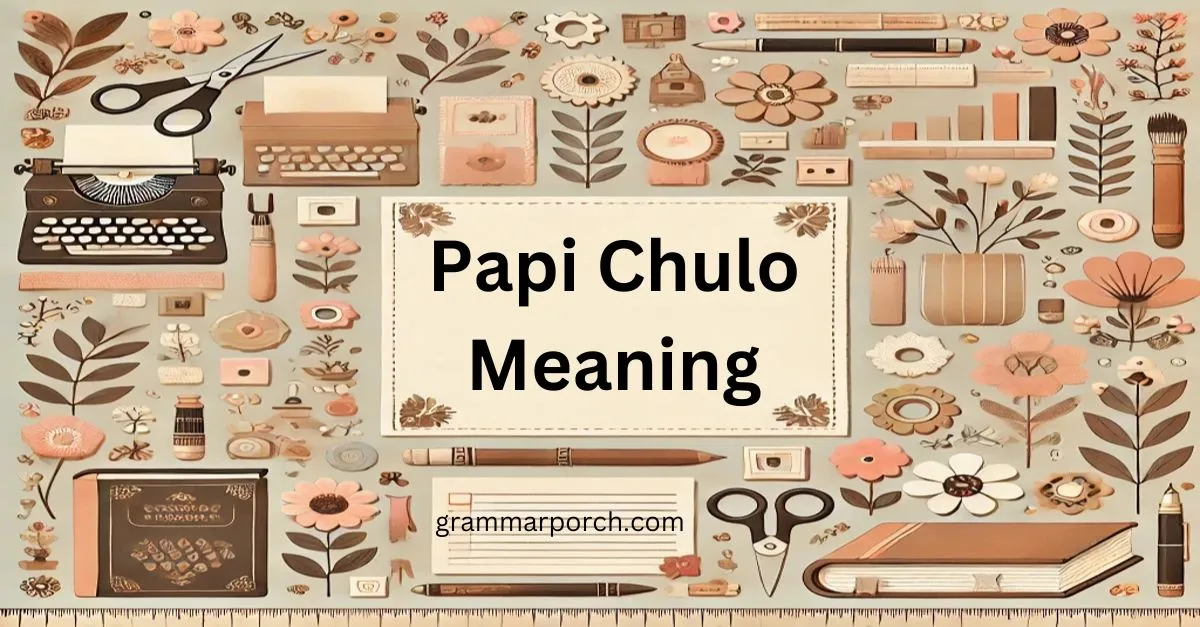If you’ve come across the phrase “Papi Chulo” in a song, social media post, or a flirty exchange and wondered about its meaning, you’re not alone. This catchy term has its roots in Spanish-speaking cultures but has since crossed linguistic and cultural barriers to become widely recognized and loved.
In this article, we’ll unpack the meaning, origins, uses, and nuances of in detail, with examples to help you master it in any conversation. Let’s dive in!
What Does “Papi Chulo” Mean?
In Spanish, “Papi” is a term of endearment that translates to “Daddy” or “Dad,” but it’s often used playfully to refer to a man affectionately, similar to “baby” or “honey” in English. “Chulo,” on the other hand, has a variety of meanings depending on the context. It can mean “cool,” “handsome,” “stylish,” or even “pimp.”
When combined, “Papi Chulo” is loosely translated to “handsome man” or “attractive guy.” However, its usage goes beyond the literal meaning. It’s often used as a flirtatious or playful nickname, highlighting someone’s charm, looks, or confidence. For example, you might hear, “Look at you, when someone is dressed stylishly or exuding confidence.
In some cases, the term can carry humorous or sarcastic undertones. For instance, a group of friends might jokingly call someone “Papi Chulo” to tease them for showing off or acting overly confident. Its flexibility makes it a fun and dynamic expression.
Where Did “Papi Chulo” Come From?
The phrase originates from Spanish-speaking cultures, particularly in Latin America. It’s commonly used in countries like Puerto Rico, Mexico, Cuba, and the Dominican Republic. The term has long been a staple in colloquial Spanish, often used in romantic or playful contexts.
However, “Papi Chulo” gained widespread global attention thanks to its presence in reggaeton and Latin pop music. One notable moment was in 2003 with Lorna’s hit song, “Papi Chulo… Te Traigo El Mmm,” which introduced the term to international audiences. The catchy tune and repetitive use of the phrase made it a cultural phenomenon.
As reggaeton and Latin music grew in popularity, so did the phrase. Artists like Daddy Yankee, Bad Bunny, and J Balvin frequently use terms like in their lyrics, solidifying its association with style, confidence, and charm. Today, the term is recognized globally, thanks to its catchy, flirtatious vibe and social media’s influence in spreading cultural expressions.
Using “Papi Chulo” in a Sentence
Understanding how to use “Papi Chulo” in context is key to making the phrase work naturally in conversation. Here are some examples to help you grasp its versatility:
- Flirty Compliment: “Wow, Papi Chulo, you’re looking so good tonight!”
- Playful Tease: “Alright, Papi Chulo, calm down with all that confidence!”
- Pop Culture Reference: “This song is all about feeling like a Papi Chulo—full of swag and charm!”
In most cases, is used with a lighthearted or flirtatious tone. It’s not just about someone’s physical appearance—it can also highlight their confidence, personality, or stylish vibe.
Remember, the delivery matters. When said with a smile or playful energy, it adds an extra layer of charm to the phrase.
Who Uses “Papi Chulo”?
Initially, “Papi Chulo” was primarily used by women in Spanish-speaking communities to refer to attractive or confident men. However, the phrase has since evolved and is now used by a broader audience.
Thanks to the global reach of Latin music, “Papi Chulo” has become part of mainstream slang in urban areas, particularly in regions with strong Latin cultural influences like Miami, Los Angeles, and New York City. Social media platforms like TikTok and Instagram have also contributed to its popularity, with users incorporating it into memes, captions, and playful exchanges.
Men sometimes use the term jokingly among friends, especially to tease someone for their self-assured or stylish behavior. Its playful nature makes it accessible to anyone, regardless of background, who wants to add a little flair to their language.
When to Use “Papi Chulo”
“Papi Chulo” is best suited for informal, playful, or flirty settings. It’s a term that conveys admiration or lighthearted teasing, making it perfect for casual conversations.
For example:
- At a party: “Look at you, Papi Chulo, owning the dance floor!”
- Complimenting a stylish friend: “You’re killing it today, Love the new haircut!”
- Playfully teasing someone acting overly confident: “Alright, let’s not get carried away!”
However, it’s essential to avoid using the phrase in professional or formal settings, as it might come across as too casual or inappropriate. It’s also wise to consider the cultural context and the person you’re addressing. Not everyone may understand the playful nature of the term, and it could be misunderstood if used with strangers or in serious situations.
Synonyms for “Papi Chulo”
If you want to mix things up or find a similar term, here are some alternatives:
- Hottie: A universal way to refer to someone attractive.
- Mr. Smooth: Perfect for highlighting someone’s charm and confidence.
- Heartthrob: Describes someone who’s widely admired for their looks or charisma.
While these phrases capture some aspects of they lack the unique cultural flair and playfulness of the original term.
Antonyms of “Papi Chulo”
On the flip side, here are some terms that convey the opposite energy of “Papi Chulo”:
- Wallflower: Refers to someone shy or reserved, lacking in charisma.
- Dork: A playful way to describe someone awkward or uncool.
- Plain Jane/Joe: Highlights a lack of standout qualities in appearance or personality.
These words are typically used in jest but don’t carry the flattering or admiring tone associated with.
When Not to Use “Papi Chulo”
While is generally a fun and positive term, there are times when it’s best left unsaid. Avoid using it:
- In formal settings: Business meetings, professional events, or any situation requiring a serious tone.
- With strangers: The term’s flirty undertone might make someone uncomfortable if they’re unfamiliar with it.
- If unsure of the context: If the audience isn’t familiar with Spanish slang, the phrase could be confusing or misinterpreted.
Final Thought
“Papi Chulo” is more than just a phrase—it’s an expression of confidence, charisma, and style. Whether you’re using it to compliment someone, tease a friend, or sing along to your favorite reggaeton track, it’s a term that brings energy and playfulness to any conversation.
By understanding its meaning, cultural roots, and proper usage, you can confidently add to your vocabulary. Just remember to use it in the right context, and you’ll undoubtedly bring a smile to someone’s face.
Want to learn more about Spanish slang? Explore other fun phrases like “Mamacita,” “Guapo,” or “Chico Lindo” to deepen your knowledge and add some flair to your conversations.

Larry is an experienced blogger with a passion for simplifying grammar. With years of expertise in writing and language, he shares insightful tips on punctuation, synonyms, and the intricacies of English grammar at **Grammar Porch**. His approachable style helps readers improve their writing skills with ease.

